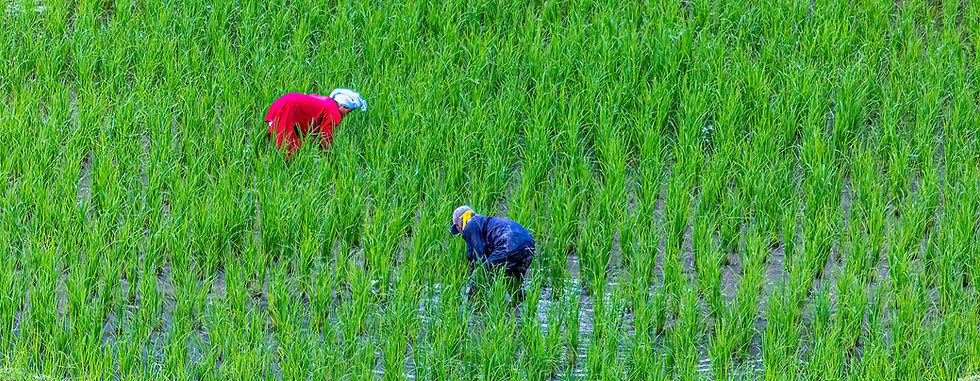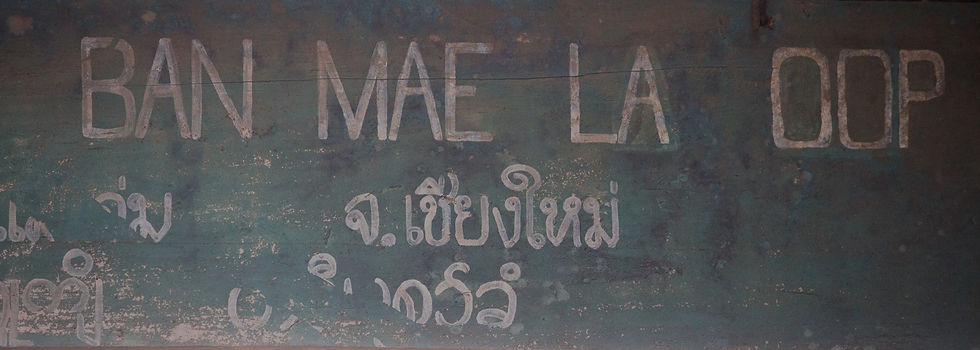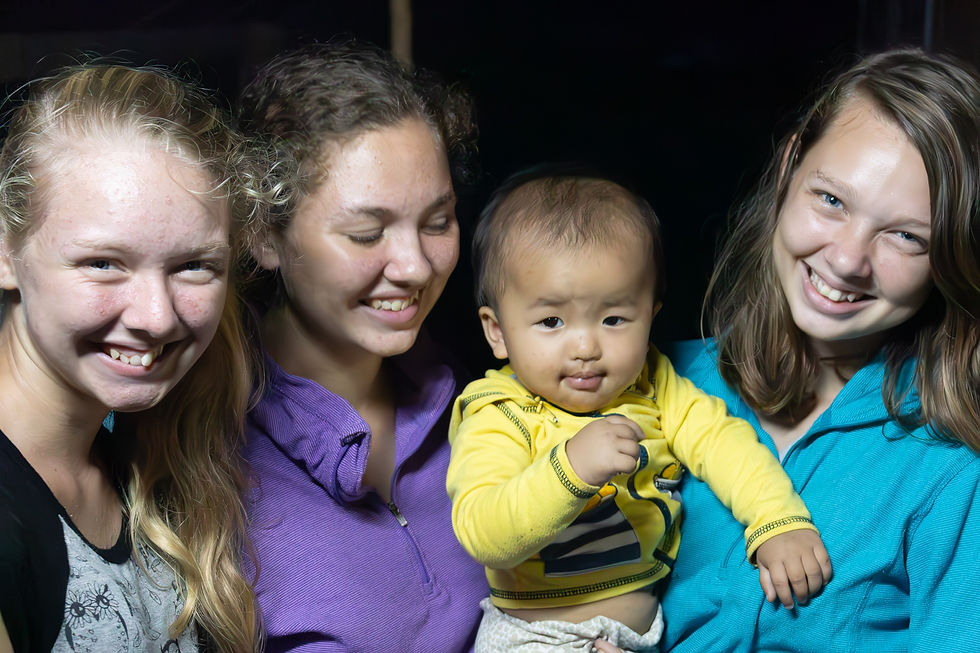Getting to Mae La Oop
- Rand Blimes

- Apr 30, 2025
- 6 min read

Note: This post is part of a series from a tiny village in northern Thailand called Mae La Oop, where I spent six weeks leading a semester-abroad program. There were no restaurants, no hotels, no tourist shops — just kind people, floor mats, and more amazing home-cooked meals than I thought one human could consume. My family and students lived with local host families, volunteered in the school, and worked alongside NGOs on grassroots development projects. It was challenging, immersive, and utterly unforgettable.
Mae La Oop: Arrival
After a few hours in the van, cruising along roads that twisted and turned with the landscape, the first victim fell. Most everyone’s stomach was under assault. My wife and I had been popping Dramamine like candy, and using a strict regimen of denial to fight off the nausea (If you don’t admit you are about to puke, you won’t puke, right?).
But no one had thrown up until now. But when it finally happened, he made up for lost time. You’ve seen Star Wars, right? You know the sound Chewbacca makes when he gets excited? Well, imagine a tall Mexican guy making that sound, only with a wet, gurgling quality, while hunched over a tiny little plastic bag. He was crammed into the back of the van, and the convulsions of his body made it impossible for him to exit, even after the driver pulled over.
He just sat there, wedged between two large guys. Throwing up Chewbacca-style.
It was horrible. But also kind of funny.
One of the guys sitting next to Chewbacca made eye contact with me in the midst of another excessively noisy round of hurling. His facial expression was priceless. He was crammed right next to Chewbacca. Legs, shoulders, hips. All pressed together. And Chewy was madly hurling away. The other guy had no way out. No escape. No choice but to sit there, making full body contact with a vomiter.
I tried not to laugh, mostly because I wondered if what goes around comes around. We were in the land of karma after all. Better to fake a sympathetic expression and hope to fool fate.
Sometime later another victim fell, but she was quiet and discreet. Later we found out that she had simply thrown up in a small baggy she had brought. She closed it up, locked it away, and disposed of it at another time. We would never have known if she hadn’t told us.
The Road to Who Knows Where
We were on the road to . . . somewhere. There was some confusion. I was traveling with a group of students studying international development. Through a mutual friend, we had been put in contact with an organization called Raks Thai that worked in northern Thailand. We were heading to a village to work alongside Raks Thai and try to learn something about how rural communities in northern Thailand were planning for future growth and development.
Where exactly were we going? We didn’t know. We knew it was a small town, but there was some disagreement over the name. We had heard Wat Chan, and we even found Wat Chan on the map. It wasn’t far from the tourist town of Pai. But we had heard other names too.
All we really knew was that you had to drive across every mountain in northern Thailand to get there.
Hopefully our driver knew where to go.
Eventually, we reached the town of Wat Chan, and the driver dropped us at the local government building. The students were excited. I had told them to prepare for a very simple village, without many of the comforts they were used to. Wat Chan had a 7-Eleven. And 3G worked on everyone’s phones. They quickly began to message loved ones that they would not, in fact, be totally cut off from the internet for the next month.
But then the driver told us to wait for another ride, which would take us to our final destination. Up in the hills. No 7-Eleven. No wifi.
Chewbacca threw up again.
Mae La Oop
Eventually a couple of pickup trucks arrived and we piled in the back. The trucks made their way up rutted, dirt roads into the mountains. After about 20 minutes, we arrived in Ban Mae La Oop. “Ban” is the Thai word for village.

And a village it was.
Houses bunched around the main road, with rice paddies surrounding the homes. The mountain slopes above us were a mix of wild forest and cultivation. We would later find out that some of what looked like wild forest was actually agriculture, with fruit trees growing not in neat rows, but in a more natural, unorganized way. It was like a forest of pomegranate, jackfruit, banana, and mango. Pineapples made the undergrowth. Nice forest, right?
We were all taken to different homes where we would stay. Mae La Oop was not developed for tourism. As far as I know, we are the only outside group to have ever stayed in the village. We didn’t sleep in "homestays" designed for visitors, like those found in other parts of Southeast Asia. We slept on the floors of local people’s homes. We shared their bathrooms. We ate with them.
It turned out to be one of the greatest experiences of my life.

Our New Family
Our host family was amazing: a father and mother, two daughters (a 9-year-old and a baby), and a grandma. The whole family was wonderful. I spent evenings with the father, teaching him English and talking about life in a Karen village (well . . . maybe that is what we talked about . . . the language barrier is a thing). He showed me how to hunt eels, and how to shoot mangoes down from the trees with a slingshot. Grandma taught my wife how to weave. To the immense sorrow of our backs, we all learned how to plant rice.
Every evening after dinner, we would sit on the front porch, watching the sun set and listening to the crescendo of frog song coming from the rice fields around us.
Our after-dinner job was to play with the baby, and we took that job very seriously.
During the days we helped at the local school, joined Raks Thai meetings, and studied Thai. There was a trickle of wifi from the community hospital, and students often gathered by the entrance to very slowly check in with home, or do who knows what online.
The food was incredible. Green curried eel. Chicken rice better than anything we had at the famous spots in Singapore. Fresh fruit from the forest. And rice grown in the very fields that surrounded us.
And always our host family. Grandma checking to see if we were OK and laughing hysterically every time we said “thank you” in Karen (they loved it when we tried, even if that one word was all we had). The baby, laughing and punching us in the face with her tiny fists. Mama making sure we had enough to eat and drink. And Papa, making sure we learned everything we could about what it was to live in a Karen village.
This didn’t feel like travel. It just felt like life in a different place.
The time we spent in Mae La Oop is something I will never forget. I learned what it means to be a good host. To be happy with a simple life while still working for more. I made good friends. I had an experience that changed me.
And I had it because travel.

Other posts in the Mae La Oop Series:



Comments